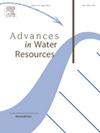A variational framework for inverse modeling: Case study in CO₂ sequestration
IF 4.2
2区 环境科学与生态学
Q1 WATER RESOURCES
引用次数: 0
Abstract
This study investigates probabilistic Bayesian inversion methods for CO2 sequestration problems, focusing on the challenges of estimating subsurface properties in high-dimensional spaces, such as permeability and porosity, and accurately quantifying uncertainties. Traditional approaches, such as gradient-based optimization, Monte Carlo sampling, and Kalman filter-based methods, have notable limitations. Gradient-based methods are computationally efficient but fail to capture uncertainty and are prone to local minima. Monte Carlo methods, while effective in posterior estimation, become computationally infeasible in high-dimensional settings due to the curse of dimensionality. Kalman filter-based methods offer some uncertainty estimation but are limited by their reliance on Gaussian-shaped posterior and weakly nonlinear assumptions for the model-data relationships. To address these challenges, this study explores variational inversion (VI) techniques, recasting Bayesian inference as an optimization problem to efficiently approximate the posterior distribution. Specifically, we apply automatic differentiation variational inference (ADVI) and Stein variational gradient descent (SVGD) to 2D and 3D CO₂ sequestration inverse problems and compare their performance against Monte Carlo sampling and the ensemble smoother with multiple data assimilation (ES-MDA). Our results demonstrate that ADVI and SVGD offer significant computational advantages over traditional methods, while still be able to capture a reliable posterior estimation. ADVI provides more reasonable mean and uncertainty estimates than ES-MDA, even with smaller number of forward runs. SVGD delivers better mean and uncertainty estimates than both ADVI and ES-MDA, with the same computational cost as ES-MDA. Both ADVI and SVGD show better scalability than ES-MDA and MCMC, meaning they are less affected by the increasing dimensionality of the model parameters. These findings highlight the potential of ADVI and SVGD to offer a reliable alternative to traditional MCMC and ES-MDA methods.
反演模型的变分框架:以二氧化碳封存为例
本研究探讨了二氧化碳封存问题的概率贝叶斯反演方法,重点研究了在高维空间中估计地下性质(如渗透率和孔隙度)以及准确量化不确定性的挑战。传统的方法,如基于梯度的优化、蒙特卡罗采样和基于卡尔曼滤波的方法,都有明显的局限性。基于梯度的方法计算效率高,但不能捕获不确定性,并且容易出现局部极小值。蒙特卡罗方法虽然在后验估计中是有效的,但由于维数的诅咒,在高维环境中变得计算不可行。基于卡尔曼滤波的方法提供了一些不确定性估计,但由于它们依赖于高斯形后验和模型数据关系的弱非线性假设而受到限制。为了解决这些挑战,本研究探索了变分反演(VI)技术,将贝叶斯推理重新塑造为一个优化问题,以有效地近似后验分布。具体而言,我们将自动微分变分推理(ADVI)和Stein变分梯度下降(SVGD)应用于2D和3D CO₂固碳逆问题,并将其与蒙特卡罗采样和多重数据同化(ES-MDA)的集成平滑性能进行比较。我们的研究结果表明,ADVI和SVGD比传统方法具有显著的计算优势,同时仍然能够获得可靠的后验估计。ADVI提供了比ES-MDA更合理的均值和不确定性估计,即使前向运行次数较少。与ADVI和ES-MDA相比,SVGD提供了更好的均值和不确定性估计,计算成本与ES-MDA相同。ADVI和SVGD都比ES-MDA和MCMC具有更好的可扩展性,这意味着它们受模型参数维数增加的影响较小。这些发现强调了ADVI和SVGD作为传统MCMC和ES-MDA方法的可靠替代方案的潜力。
本文章由计算机程序翻译,如有差异,请以英文原文为准。
求助全文
约1分钟内获得全文
求助全文
来源期刊

Advances in Water Resources
环境科学-水资源
CiteScore
9.40
自引率
6.40%
发文量
171
审稿时长
36 days
期刊介绍:
Advances in Water Resources provides a forum for the presentation of fundamental scientific advances in the understanding of water resources systems. The scope of Advances in Water Resources includes any combination of theoretical, computational, and experimental approaches used to advance fundamental understanding of surface or subsurface water resources systems or the interaction of these systems with the atmosphere, geosphere, biosphere, and human societies. Manuscripts involving case studies that do not attempt to reach broader conclusions, research on engineering design, applied hydraulics, or water quality and treatment, as well as applications of existing knowledge that do not advance fundamental understanding of hydrological processes, are not appropriate for Advances in Water Resources.
Examples of appropriate topical areas that will be considered include the following:
• Surface and subsurface hydrology
• Hydrometeorology
• Environmental fluid dynamics
• Ecohydrology and ecohydrodynamics
• Multiphase transport phenomena in porous media
• Fluid flow and species transport and reaction processes
 求助内容:
求助内容: 应助结果提醒方式:
应助结果提醒方式:


